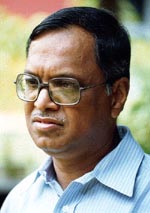|
|
| Help | |
| You are here: Rediff Home » India » Business » Special » Features |
|
| ||||||||||||||||||||||||||||||||||||||||||||
|
| ||||||||||||||||||||||||||||||||||||||||||||
From running India's most well-known software company Infosys [Get Quote] Technologies to doling out advice on issues relating to the nation's economy and advocating cures for ills plaguing the country, Infosys Chairman N R Narayana Murthy has come a long way on the national stage in his advisory capacity.
On April 6, it was time for him to do a 'star' turn and advise the Indian film and media industry on what it could learn from the successes of the Indian software industry.
 He delivered, in his inimitable style -- with loads of self-deprecating humour thrown in -- the valedictory address on the concluding day of the three-day entertainment industry summit, FICCI Frames 2005, in Mumbai, April 6.
He delivered, in his inimitable style -- with loads of self-deprecating humour thrown in -- the valedictory address on the concluding day of the three-day entertainment industry summit, FICCI Frames 2005, in Mumbai, April 6.
1. Have a global mindset
The first lesson doled out to an eager audience was: 'To succeed you need to have a global mindset.'
"To have a global mindset, you need to produce where it is most cost-efficient, source capital from where it is the cheapest, and sell where it is the most profitable. When we (Infosys) set out, we knew that India had the talent and the markets were in the West. The Indian film industry is similar to the IT industry," he said.
"The film industry is knowledge-based, where talent is crucial and creativity very high. The rules of globalization apply very well to the film industry and media," Murthy said.
2. Benchmark yourself with the best
"Benchmark yourself to the best in the world and have very high aspirations," he said, pointing out that the only way to achieve this was to look at serving mainstream markets in the world and not just ethnic markets abroad.
And to serve those markets, Murthy had some ideas too. "To achieve that, one needs to make movies with global themes that have relevance outside India -- like adventure and history."
"The Spanish market, for example, like the Indian market loves social dramas. Would it not be possible for our movie makers to make a social drama with actors drawn from different nationalities which in turn have a global appeal?" Murthy asked.
To buttress his point, he pointed out that Hollywood last year made 250 movies that grossed $32 billion worldwide. India in contrast made 800 films, which did business of just over $1 billion.
3. Scalability through corporatisation
If one needs to make movies with a global audience in mind, one needs to scale up fast. And scaling up, according to Murthy, could happen only if the film/media industry was corporatised.
"In order to scale up you need high quality human resources. This is a common challenge all of us have in the IT and media/film industry. The challenge always is how do we recruit, train and retain youngsters. And this a challenge that can be addressed only if the industry is corporatised," Narayana Murthy said.
"Corporatisation will ensure that the organisation is meritocracy driven and will help organisations retain the best talent, with the result that the value of the organisation goes up."
Murthy pointed out that the value of Infosys at 9.15 a.m. in the morning when the workforce was in attendance was $19 billion, but when they go home at about 6 in the evening, Infosys' valuation was zero.
He conveyed that employees make up the real valuation of a company. Without good talented employees, the valuation of a company plummets.
4. Success through project management
Murthy said that when he got an opportunity to interact with Richard Attenborough, director of the Oscar-winning film Gandhi, he asked him what was his secret to success. "He (Attenborough) replied that his success as a filmmaker lay in project management. I would urge the film industry to use project management as a tool for success and progress. We have used project management skills to great success in the IT industry and I see no reason why this could not be used in the film industry."
5. Go for quality certifications
Urging the film/media industry to go in for quality certifications like the Indian IT industry has done through the use of certifications like SEI CMM and ISO, Narayana Murthy said that this would definitely have an impact on the kind of movies being produced in the country.
"Quality is important and I would urge the industry to go in for such certifications that are available for their industry."
More Specials|
|
| © 2008 Rediff.com India Limited. All Rights Reserved. Disclaimer | Feedback |